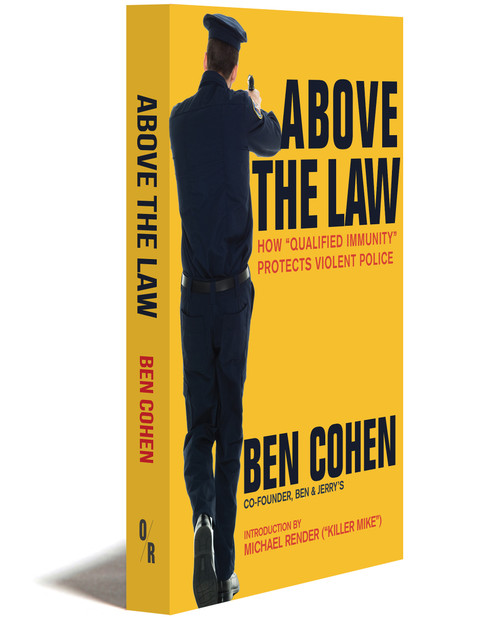Above the Law
“An unflinching indictment ... essential reading.”
— Porsha Williamsabout the bookabout
• A police officer kills a twelve-year-old boy. It’s caught on video. The officer gets off.
• A police officer strangles a man selling cigarettes. It’s caught on video. The officer gets off.
• A police officer shoots a man in his car. It’s live-streamed. The officer gets off.
It happens over and over again. The culprit here, alongside the cops, is Qualified Immunity (QI), a legal principle which Reuters describes as “a nearly failsafe tool to let police brutality go unpunished and deny victims their constitutional rights.”
Originally intended to protect cops from being sued over good faith mistakes, courts have interpreted QI so broadly that police are shielded from accountability in all but the rarest of circumstances. Only when the exact same abusive behavior was already deemed unconstitutional by a court in the exact same jurisdiction can victims succeed in a prosecution.
Above the Law recounts 12 cases in which justice was denied because of QI. The stories are accompanied by infographics, timelines, and contextualizing background to create a concise and compelling indictment of an outrageously unjust legal principle that must be changed.
“How can police shoot a man in the back as he's walking away, five seconds into an encounter? Or let a K-9 attack a man who's sitting down, surrendering with his arms in the air? More importantly: how do they get away with it? This book is a fantastic primer to a critical issue.”
—State Senator Nina Turner
About The Author / Editor
Preview
Walking While Black
In the summer of 2016, David Collie worked full-time building produce displays for supermarkets in Fort Worth, Texas. He was saving up to return to college that fall. On the night of July 27, David went to visit some friends who lived nearby. He wanted to check in and say hello to their kids. They called him “Uncle David.”
Meanwhile, two off-duty police officers heard a radio description of two suspects in a nearby robbery. The dispatcher described the suspects: Black males in their teens or early twenties, one 6’1”, the other 6’4.” The suspects, one apparently armed with a small pistol, stole two pairs of sneakers after arranging a deal on Facebook.
The cops saw David—5’6” and 33 years old (at least seven inches shorter and 10 years older) but Black—walking into his friends’ apartment complex. They shouted at him from their unmarked car as he continued to walk toward his friends’ apartment. But David didn’t know what they wanted. Did they want to see his hands? Did they want to know where he was going? “I was trying to comply,” David recalled. “I did hear him say ‘take your hand out of your pocket,’” David told a reporter a few months later. “So in my mind, I’m, like, trying to be like, ‘look, I’m showing my hand.’”
David took his hand out of his pocket, raised his right arm, and pointed away from the cops, toward the nearest building, where he was headed. That’s when one cop, standing 34 feet away, opened fire, and shot David in the back, severing his spine.
in the media
Above the Law
“An unflinching indictment ... essential reading.”
— Porsha Williamsabout the bookabout
• A police officer kills a twelve-year-old boy. It’s caught on video. The officer gets off.
• A police officer strangles a man selling cigarettes. It’s caught on video. The officer gets off.
• A police officer shoots a man in his car. It’s live-streamed. The officer gets off.
It happens over and over again. The culprit here, alongside the cops, is Qualified Immunity (QI), a legal principle which Reuters describes as “a nearly failsafe tool to let police brutality go unpunished and deny victims their constitutional rights.”
Originally intended to protect cops from being sued over good faith mistakes, courts have interpreted QI so broadly that police are shielded from accountability in all but the rarest of circumstances. Only when the exact same abusive behavior was already deemed unconstitutional by a court in the exact same jurisdiction can victims succeed in a prosecution.
Above the Law recounts 12 cases in which justice was denied because of QI. The stories are accompanied by infographics, timelines, and contextualizing background to create a concise and compelling indictment of an outrageously unjust legal principle that must be changed.
“How can police shoot a man in the back as he's walking away, five seconds into an encounter? Or let a K-9 attack a man who's sitting down, surrendering with his arms in the air? More importantly: how do they get away with it? This book is a fantastic primer to a critical issue.”
—State Senator Nina Turner
About The Author / Editor
Preview
Walking While Black
In the summer of 2016, David Collie worked full-time building produce displays for supermarkets in Fort Worth, Texas. He was saving up to return to college that fall. On the night of July 27, David went to visit some friends who lived nearby. He wanted to check in and say hello to their kids. They called him “Uncle David.”
Meanwhile, two off-duty police officers heard a radio description of two suspects in a nearby robbery. The dispatcher described the suspects: Black males in their teens or early twenties, one 6’1”, the other 6’4.” The suspects, one apparently armed with a small pistol, stole two pairs of sneakers after arranging a deal on Facebook.
The cops saw David—5’6” and 33 years old (at least seven inches shorter and 10 years older) but Black—walking into his friends’ apartment complex. They shouted at him from their unmarked car as he continued to walk toward his friends’ apartment. But David didn’t know what they wanted. Did they want to see his hands? Did they want to know where he was going? “I was trying to comply,” David recalled. “I did hear him say ‘take your hand out of your pocket,’” David told a reporter a few months later. “So in my mind, I’m, like, trying to be like, ‘look, I’m showing my hand.’”
David took his hand out of his pocket, raised his right arm, and pointed away from the cops, toward the nearest building, where he was headed. That’s when one cop, standing 34 feet away, opened fire, and shot David in the back, severing his spine.







